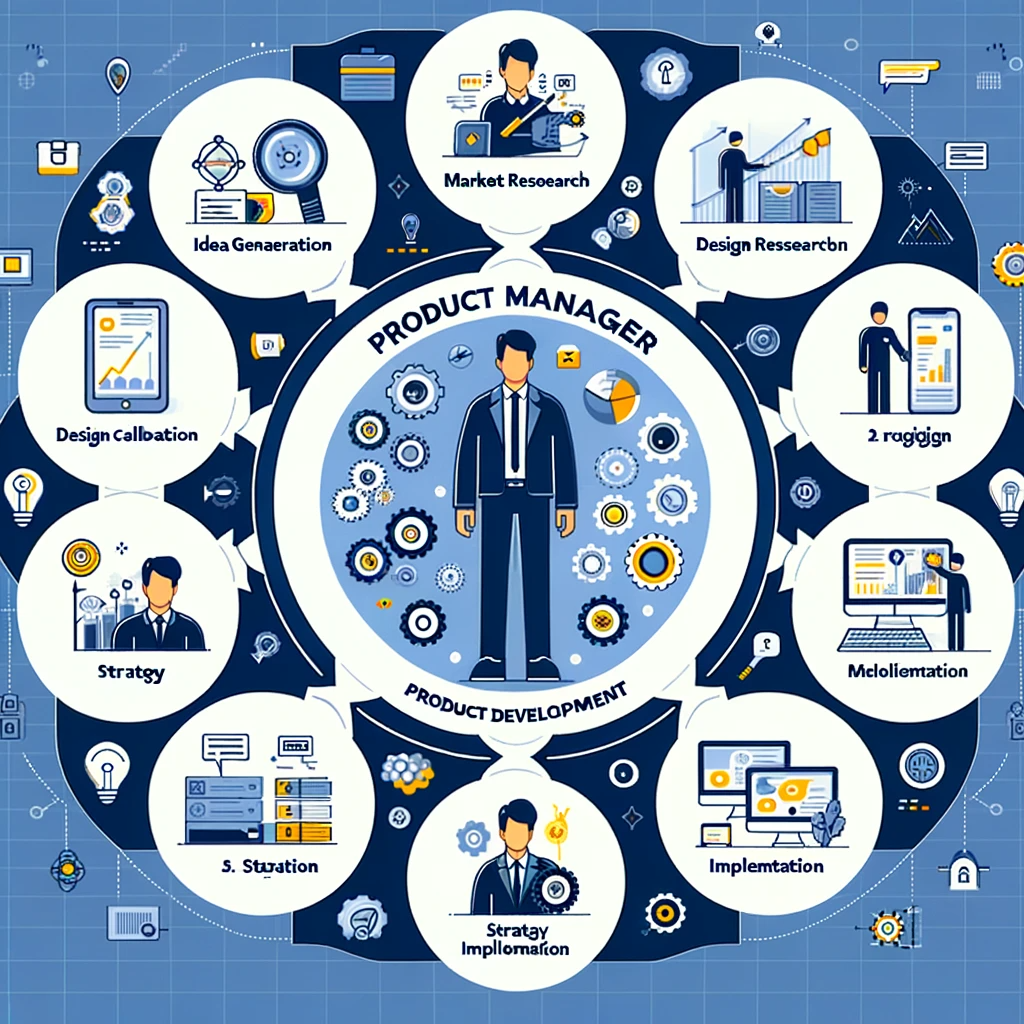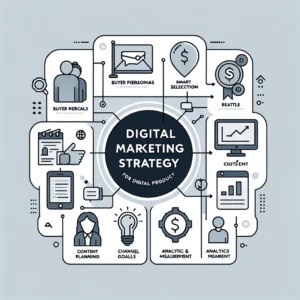The role of a product manager is both critical and multifaceted. Balancing the intricate dance between customer needs, technological advancements, and business objectives, product managers emerge as the pivotal figures steering the course of product development. They are the visionaries who identify what to build and the strategists who determine how to build it. This deep dive into the world of product management will unravel the layers of this complex role, spotlighting its significance in the lifecycle of product development, and illustrating the broad spectrum of skills required to excel in this position. For those in the throes of product management or aspiring to enter this field, this article will serve as a guide, offering insights and strategies to navigate the challenges and triumphs of product management in the contemporary business landscape.
Understanding the Product Manager’s Role
Defining the Product Manager: A Multifaceted Role
The product manager is often seen as the CEO of the product, occupying a central position at the intersection of business, technology, and user experience. This role has evolved significantly over time, emerging as a key player in modern business strategies. A product manager’s responsibilities are extensive and varied, extending from identifying customer needs and business objectives to articulating a product’s success metrics. They are tasked with envisioning and actualizing a product that not only addresses customer requirements but also contributes to the larger business goals. The complexity of this role stems from its relatively recent inception in the business world, where it continually adapts and redefines its scope to align with the ever-changing market demands and technological advancements.
The Evolution and Importance of Product Management in Businesses
Product management, as a discipline, has undergone significant transformation, becoming increasingly vital in steering companies toward innovation and market relevance. In the past, product management might have been an offshoot of engineering, design, or marketing departments. Today, it stands as a distinct and critical function within a business. Product managers now play a crucial role in aligning the product’s direction with the company’s strategic objectives. They are the linchpins that connect various facets of a business, ensuring that the product not only resonates with customers but also drives the business forward in a competitive market. The evolution of product management signifies its growing importance in not just creating products, but in shaping the future trajectory of businesses.
Key Responsibilities of a Product Manager in Development

Idea Generation and Screening: The Foundation of Product Development
The journey of product development begins with idea generation, where product managers play a pivotal role. They brainstorm with teams to sift through various concepts, evaluating each for its potential to resolve user pain points. This stage is crucial as it sets the foundation for what will eventually become the product. Product managers survey the landscape of ideas, applying their insight and expertise to finalize the features and capabilities that will be built. This process is not just about generating ideas; it’s about identifying those that align with both user needs and business objectives, ensuring that the product development process starts on the right foot.
Design and Discovery: Shaping User Experience and Market Fit
Once the foundational ideas are set, product managers step into the realms of design and discovery. This stage involves defining user personas, conducting thorough market research, and analyzing competitor products. The product manager collaborates closely with designers to map out the user journey, focusing on crafting a top-notch user experience that meets market demands. They ensure that the design and functionality of the product align seamlessly, creating a product that not only functions well but also resonates with the target audience. This stage is all about bridging the gap between an idea and its realization, ensuring that the product developed is not just viable but also desirable in the market.
Development and Testing: Bridging Vision and Execution
In the development and testing phase, product managers transition from planning to execution. Working closely with development teams, they help translate the product vision into tangible features. This phase is about turning ideas into reality, where product managers oversee the building and refining of the product. They collaborate with QA teams to ensure that each feature delivers value and aligns with user expectations. It’s a phase that demands a keen eye for detail and a robust understanding of both the product and the user, ensuring that what is developed truly meets the needs it set out to address.
The Product Manager’s Impact on Each Stage of the Product Lifecycle
Launch Phase: Introducing the Product to the Market
The launch phase is a critical period in the product lifecycle, marking the transition from development to market introduction. During this phase, the product manager takes on the role of a subject matter expert, working closely with the marketing team to educate early adopters about the product’s benefits. This involves a deep understanding of the product’s core values and the ability to articulate them clearly to internal teams such as marketing, engineering, support, sales, and design. The product manager’s responsibility extends beyond just launching the product; it includes validating the market need and ensuring that the product fills a gap in the market. This phase sets the tone for the product’s future success and requires a strategic approach to ensure that the product resonates with its intended audience.
Growth Phase: Scaling the Product and Outmaneuvering Competition
Once the product has successfully launched, the growth phase begins. This is where the product proves its market fit, and demand starts to rise. The product manager must navigate through increasing sales, emerging competition, and the need to establish strong brand value. In this stage, the focus shifts to maintaining or improving customer satisfaction, collaborating with marketing and sales to ensure competitive pricing, and working toward maximizing revenue and market share. The product manager plays a pivotal role in guiding the product’s trajectory, ensuring that it not only grows but also sustains its growth in a competitive market.
Maturity Phase: Sustaining Success and Preparing for Evolution
The maturity stage of a product is characterized by peaked sales and a constant income stream. This is a crucial time for product managers to assess past performance, identify areas for improvement, and strategize ways to boost retention and customer satisfaction. The challenge during this stage is to maintain the product’s relevance and competitive edge in an increasingly saturated market. Product managers focus on retaining existing market share and differentiating the product from competitors. This involves exploring new markets, enhancing the product to meet evolving user needs, and ensuring high customer satisfaction to prolong the product’s life cycle.
Collaboration and Communication: The Key to Effective Product Management
Working with Cross-Functional Teams: A Collaborative Approach
Product management is inherently collaborative, requiring the product manager to work closely with various cross-functional teams, including business analysts, designers, and developers. Building and maintaining strong relationships with these teams is essential for effective product management. A good relationship fosters trust and open communication, which are vital for the successful execution of a product strategy. Product managers often face challenges such as budget constraints and release delays, and their ability to navigate these roadblocks effectively depends largely on their established relationships and communication skills.
Effective Communication: The Bedrock of Product Management Success
At the core of product management lies the skill of effective communication. Whether it’s presenting plans and ideas to stakeholders, communicating with customers, or coordinating with internal teams, the ability to convey ideas clearly and persuasively is essential. Product managers must possess excellent written and verbal communication skills to build relationships, gain support for their vision, and ensure that everyone is aligned with the product strategy. This also includes the ability to engage in technical debates and make informed decisions, balancing project timelines and budget constraints.
Essential Skills and Competencies for a Product Manager
Technical Understanding and Business Acumen: The Dual Requirements
While product managers are not directly involved in writing code or designing products, a solid understanding of technical principles is crucial. This knowledge aids in effective communication with developers and engineers and helps product managers grasp what is required for project success. Alongside technical skills, a strong grasp of business operations is also vital. Product managers must understand financial aspects like pricing, revenue, and costs, as these play a significant role in deciding which features to include in a product and how to align them with the company’s return on investment goals.
Leadership and Strategic Thinking: Steering the Product Vision
Leadership is a key component of a product manager’s role. Whether leading a team of other product managers or working independently, the ability to influence and steer internal teams towards a common goal is critical. This requires not only strategic thinking and decision-making skills but also the ability to defend decisions with logic and data. Product managers must also possess empathy to understand customer needs and engage with them effectively, ensuring that their problems are addressed throughout the development process.
Challenges and Solutions in Product Management
Navigating Common Obstacles in Product Development
Product development is a field rife with challenges, ranging from technical roadblocks to market uncertainties. Product managers often face hurdles like aligning cross-functional teams, managing stakeholder expectations, and adapting to evolving market trends. Successfully navigating these obstacles requires a blend of strategic thinking, adaptability, and problem-solving skills. Product managers must be adept at identifying risks and proposing mitigation strategies to minimize their impact.
Leveraging Data and Feedback for Continuous Improvement
A key aspect of product management is the continuous evaluation of product performance. This involves collecting and analyzing feedback from users, identifying gaps between the product and user needs, and using these insights to guide future product development. Product managers should establish processes to gather ideas from customers and internal teams, ensuring that the product evolves in alignment with user needs and market demands. By leveraging data and feedback, product managers can drive innovation and ensure that the product remains relevant and competitive.
Conclusion
Mastering Product Management: A Deep Dive into the Role in Product Development
In conclusion, the role of a product manager in product development is multifaceted and dynamic. It involves a deep understanding of customer needs, market trends, and business objectives. Through effective collaboration, communication, and strategic thinking, product managers play a crucial role in guiding a product from conception to market success. By mastering the essential skills and competencies of product management and adeptly navigating its challenges, product managers can significantly impact the success and longevity of the products they shepherd. This exploration into the world of product management highlights the importance of this role in the contemporary business landscape, providing valuable insights for those embarking on or advancing in this exciting and challenging career path.




